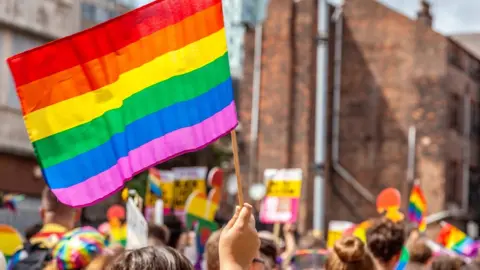Media watchdog Ofcom quits Stonewall diversity scheme
 Getty Images
Getty ImagesThe media watchdog Ofcom has withdrawn from the equality workplace scheme run by Britain's best-known LGBTQ+ charity.
The Diversity Champions scheme is run by Stonewall and organisations which are members get advice on making workplaces inclusive.
Ofcom said it had withdrawn because of the need to remain impartial and independent at all times.
Stonewall said it fully respects Ofcom's decision - but it was sad its scheme is seen by some as unimpartial.
Hundreds of private and public organisations - including the BBC - are members of the Diversity Champions scheme.
In return for an annual payment, members receive advice on issues such as the use of personal pronouns at work, and whether single-sex toilets should be accessible to transgender people.
Ofcom is the latest organisation to leave the scheme. In March the Equality and Human Rights Commission (EHRC) announced it had also withdrawn, citing cost issues.
Ofcom, in a statement to the BBC, said: "As the communications regulator, an important part of our responsibility is to ensure we remain impartial and independent at all times.
"Our commitment to supporting the rights and freedoms of LGBTQ+ people is as strong as ever."
Ofcom also said that, "having laid the foundations that will help us improve support for LGBTQ+ colleagues, we're confident that we can move ahead positively, without continuing with the Diversity Champions programme".
Despite leaving the Diversity Champions scheme, Ofcom confirmed it will still participate in Stonewall's Equality Index, where employers are judged and ranked on their inclusive workplace policies.

Why has Ofcom withdrawn?
In December, Ofcom's chief executive Dame Melanie Dawes appeared to suggest at a parliamentary select committee that the BBC should not talk to a charity called the LGB Alliance, which has emerged as a rival to Stonewall.
Critics accuse the LGB Alliance of transphobia, because it campaigns for lesbian, gay and bisexual rights, but not transgender people. It denies the allegation.
Afterwards Ofcom said that Dame Melanie had not meant to imply that broadcasters should not talk to gender-critical groups. And today they told me that her comments at the time had been misinterpreted, and that she was simply seeking to make the point that all in-air debates must be balanced.
I understand there is some frustration within the organisation about the circumstances of that particular exchange and the subsequent reporting of it.
Ofcom's decision to withdraw from Stonewall's scheme - which supports trans rights - could be seen as a way to avoid being seen as taking sides in any debate on trans issues.

In May, a barrister-led report into two incidents at the University of Essex - where female academics who were accused of transphobia had speaking engagements withdrawn - found that Stonewall may have given incorrect and potentially illegal advice to the University, something it denies.
In the past, Stonewall has denied giving misleading advice to employers, and maintained that there is no clash between trans and women's rights.
In a statement, Stonewall said: "We fully respect Ofcom's decision and will continue to work with them in their role as the UK's communication regulator.
"It is sad, however, that involvement in a programme that supports an inclusive workplace for LGBTQ+ employees should be in any way regarded as an unimpartial act.
"As with every membership programme, organisations come and go depending on what works best for their inclusion journey at the time, and we're very proud of the work we've done with Ofcom and wish them the best in their ongoing efforts to support all of their LGBTQ+ employees. It's a simple human right that everyone, including LGBTQ+ staff, is free from discrimination and prejudice at work, and our Diversity Champions programme is one way for organisations to be supported in this."
Correction: An earlier version of this article referred to the types of advice provided by the Diversity Champions scheme, including transgender people's access to single-sex toilets. However the wording used did not accurately reflect Stonewall's position on the issue and so this line was amended on the 27th August.

- THE DEEPER YOU GO, THE DARKER IT GETS: A tense new thriller from the producers of Line of Duty
- SERENGETI II: Humour, heartbreak and tension with Africa's most charismatic animals

